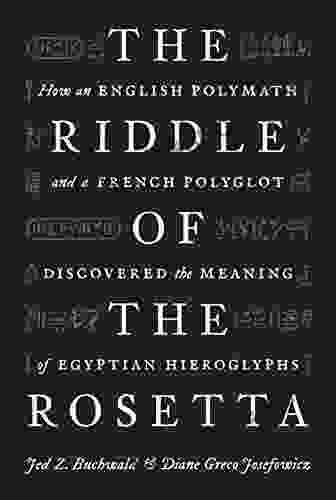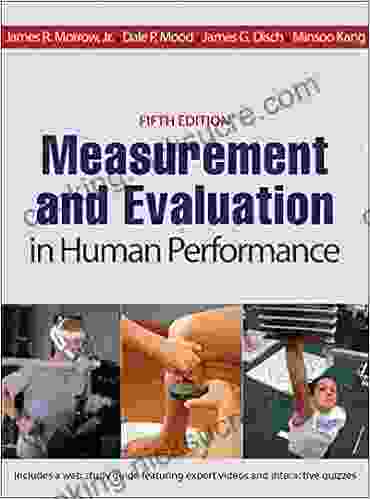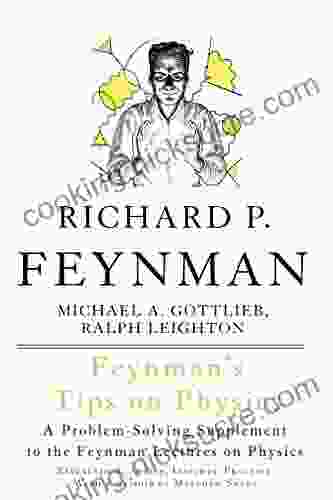Measurement and Evaluation in Human Performance: A Comprehensive Exploration

Measurement and evaluation are fundamental pillars in the field of human performance. They provide a systematic and objective means to assess individuals' abilities, skills, and behaviors, enabling researchers and practitioners to make informed decisions about interventions, training programs, and performance enhancement strategies.
This article delves into the intricacies of measurement and evaluation in human performance, exploring the essential concepts, techniques, and applications in this domain.
4.5 out of 5
| Language | : | English |
| File size | : | 592196 KB |
| Text-to-Speech | : | Enabled |
| Screen Reader | : | Supported |
| Word Wise | : | Enabled |
| Print length | : | 480 pages |
| Lending | : | Enabled |
Measurement in Human Performance
Measurement refers to the process of quantifying and characterizing human attributes or behaviors. It involves identifying observable and measurable indicators that represent the desired construct or characteristic being assessed.
Types of Measurement
In human performance, various types of measurement exist, including:
* Objective measures: Quantify performance using physical or physiological parameters (e.g., speed, force, heart rate). * Subjective measures: Capture self-reported perceptions, attitudes, and subjective experiences (e.g., questionnaires, interviews). * Direct measures: Measure performance directly (e.g., time to complete a task). * Indirect measures: Infer performance based on related variables (e.g., muscle activation patterns).
Reliability and Validity
Two key criteria for reliable measurement are reliability and validity. Reliability refers to the consistency and stability of the measurement over time or across different observers. Validity ensures that the measurement accurately represents the intended construct it is designed to assess.
Evaluation in Human Performance
Evaluation involves interpreting and drawing s based on the collected measurement data. Its primary purpose is to assess the effectiveness of interventions, programs, or strategies and to identify areas for improvement.
Evaluation Models
Various evaluation models exist, including:
* Experimental designs: Compare experimental and control groups to isolate the effects of an intervention. * Quasi-experimental designs: Lack random assignment of participants but employ other strategies to control for confounding variables. * Non-experimental designs: Describe and explore performance without manipulating variables.
Data Analysis
Evaluation typically involves statistical analysis of the measurement data. Statistical tests are employed to determine the significance of differences between groups or the effects of interventions.
Applications of Measurement and Evaluation
Measurement and evaluation play crucial roles in various aspects of human performance, including:
* Talent assessment: Identifying individuals with exceptional abilities for specific roles or professions. * Talent development: Designing and evaluating training programs to enhance performance and potential. * Performance improvement: Identifying performance gaps and implementing interventions to enhance outcomes. * Injury prevention: Assessing risk factors and developing strategies to prevent injuries. * Rehabilitation: Monitoring progress and evaluating the effectiveness of rehabilitation protocols.
Challenges in Measurement and Evaluation
Despite its significance, measurement and evaluation in human performance face several challenges:
* Subjectivity and bias: Subjective measures can be influenced by factors such as personal biases, mood, and environmental conditions. * Reactivity: The act of measurement itself can sometimes alter the behavior being measured. * Validity and reliability limitations: Even carefully developed measures may have limitations in terms of validity and reliability.
Measurement and evaluation are essential tools for understanding and enhancing human performance. By quantifying and assessing attributes, behaviors, and outcomes, researchers and practitioners can gain valuable insights into the factors that influence performance and optimize interventions accordingly.
While challenges exist, ongoing research and advancements in measurement and evaluation methods continue to improve their accuracy, reliability, and validity, ensuring their continued relevance in the field of human performance.
4.5 out of 5
| Language | : | English |
| File size | : | 592196 KB |
| Text-to-Speech | : | Enabled |
| Screen Reader | : | Supported |
| Word Wise | : | Enabled |
| Print length | : | 480 pages |
| Lending | : | Enabled |
Do you want to contribute by writing guest posts on this blog?
Please contact us and send us a resume of previous articles that you have written.
 Fiction
Fiction Non Fiction
Non Fiction Romance
Romance Mystery
Mystery Thriller
Thriller SciFi
SciFi Fantasy
Fantasy Horror
Horror Biography
Biography Selfhelp
Selfhelp Business
Business History
History Classics
Classics Poetry
Poetry Childrens
Childrens Young Adult
Young Adult Educational
Educational Cooking
Cooking Travel
Travel Lifestyle
Lifestyle Spirituality
Spirituality Health
Health Fitness
Fitness Technology
Technology Science
Science Arts
Arts Crafts
Crafts DIY
DIY Gardening
Gardening Petcare
Petcare Sameera Khan Rd Pa C
Sameera Khan Rd Pa C Mara Vorhees
Mara Vorhees Jefferson Hawkins
Jefferson Hawkins Andrew Duncan
Andrew Duncan Necoco
Necoco Tracy Townsend
Tracy Townsend Stan Tekiela
Stan Tekiela Laurie Seale
Laurie Seale 18th Edition Kindle Edition
18th Edition Kindle Edition Tony Herman
Tony Herman Tom Lodziak
Tom Lodziak Thomas S Kuhn
Thomas S Kuhn Jeremy Freese
Jeremy Freese 24th Edition Kindle Edition
24th Edition Kindle Edition Andrea Curtis
Andrea Curtis Marvin L Bittinger
Marvin L Bittinger Thomas Berger
Thomas Berger Michael T Nygard
Michael T Nygard Martin Rooney
Martin Rooney George Christian Pappas
George Christian Pappas Jennifer L Armentrout
Jennifer L Armentrout John Ramirez
John Ramirez Frances Evesham
Frances Evesham Jenna Miscavige Hill
Jenna Miscavige Hill Benedict Carey
Benedict Carey Elizabeth Clor
Elizabeth Clor Michael S Malone
Michael S Malone Tod Schimelpfenig
Tod Schimelpfenig Future Publishing
Future Publishing Brian C Muraresku
Brian C Muraresku Leslie Morgan Steiner
Leslie Morgan Steiner Ben Orlin
Ben Orlin Andrea Cremer
Andrea Cremer John Bantin
John Bantin Matt Fulks
Matt Fulks Mark Hume
Mark Hume Dr Gabriel Peter Salgo
Dr Gabriel Peter Salgo Nick Peters
Nick Peters Jenny Mackay
Jenny Mackay William F Sensakovic
William F Sensakovic Tamara Ireland Stone
Tamara Ireland Stone Andrea Wachter
Andrea Wachter Rob Taylor
Rob Taylor Robert Jay Lifton
Robert Jay Lifton Donna Bollinger
Donna Bollinger Becky Lomax
Becky Lomax Andrea Olson
Andrea Olson Mike Gauthier
Mike Gauthier Steven J Matthiesen
Steven J Matthiesen Andrew Greiner
Andrew Greiner Antonio Iturbe
Antonio Iturbe Josh Tabor
Josh Tabor Matt Richtel
Matt Richtel Raymond E Feist
Raymond E Feist Sandy Stott
Sandy Stott Francesca Zappia
Francesca Zappia Mason Deaver
Mason Deaver E K Johnston
E K Johnston Bruce D Perry
Bruce D Perry Harriet Brown
Harriet Brown Maria Konnikova
Maria Konnikova Linda Eyre
Linda Eyre Eugene Raikhel
Eugene Raikhel Eric Engle
Eric Engle Stacey Little
Stacey Little James A Middleton
James A Middleton Andrew Blauner
Andrew Blauner Bruce Bowlen
Bruce Bowlen Tillie Walden
Tillie Walden Bisco Hatori
Bisco Hatori Steven Johnson
Steven Johnson Walter Greiner
Walter Greiner David Alloway
David Alloway Deaver Brown
Deaver Brown Rizwan Virk
Rizwan Virk Guillermo Ferrara
Guillermo Ferrara Malinda Lo
Malinda Lo Adam Mansbach
Adam Mansbach Baz Thompson
Baz Thompson M D Johnson
M D Johnson Laird Hamilton
Laird Hamilton Greg Presto
Greg Presto Charles H Hapgood
Charles H Hapgood Dani Jacobs
Dani Jacobs Tom Lecompte
Tom Lecompte Pete Pfitzinger
Pete Pfitzinger Rick Westhead
Rick Westhead Nancy Mcwilliams
Nancy Mcwilliams Jen Calonita
Jen Calonita Ben Doughty
Ben Doughty Bernard A Chavis
Bernard A Chavis Hasok Chang
Hasok Chang Lisa Bond
Lisa Bond Andrew Goliszek
Andrew Goliszek Patrick Hatt
Patrick Hatt Lucia Ashta
Lucia Ashta Andrea Cataldo
Andrea Cataldo Jay Greeson
Jay Greeson David Borgenicht
David Borgenicht Ruby Walker
Ruby Walker Hayley Campbell
Hayley Campbell Andrew Feinberg
Andrew Feinberg Marissa Meyer
Marissa Meyer Robyn Sheldon
Robyn Sheldon L Michele Issel
L Michele Issel Rachel Atwood
Rachel Atwood Arlo Adams
Arlo Adams Sean Pidgeon
Sean Pidgeon Keith Sutton
Keith Sutton Jacqueline Edmondson
Jacqueline Edmondson Steve Anthony Tallon
Steve Anthony Tallon Robert Sky Allen Ph D
Robert Sky Allen Ph D Christian Keur
Christian Keur David Scott
David Scott Chris Salisbury
Chris Salisbury James E Wisher
James E Wisher Raymond Coppinger
Raymond Coppinger Bobby Orr
Bobby Orr Paul Stamets
Paul Stamets Jed Z Buchwald
Jed Z Buchwald Wolfgang Hohlbein
Wolfgang Hohlbein Victoria Ortiz
Victoria Ortiz Jennifer Blair
Jennifer Blair Charles Szypszak
Charles Szypszak Gabrielle Coleman
Gabrielle Coleman Stephan J Guyenet
Stephan J Guyenet Elizabeth Marshall Thomas
Elizabeth Marshall Thomas David Montgomery
David Montgomery Milo Stewart
Milo Stewart Terence Callery
Terence Callery Hugh Raffles
Hugh Raffles Sara Manning Peskin
Sara Manning Peskin Carmen Micsa
Carmen Micsa Ed Willes
Ed Willes Laurie Ann Thompson
Laurie Ann Thompson Ian O Connor
Ian O Connor Dot Edu
Dot Edu Kenneth S Shultz
Kenneth S Shultz Prasad Raju V V N R Pathapati
Prasad Raju V V N R Pathapati Andre Watson
Andre Watson Arianna Astuni
Arianna Astuni Ronald D Davis
Ronald D Davis Mary Keith Piasecki
Mary Keith Piasecki Mike Cyra
Mike Cyra Gerald A Moore Sr
Gerald A Moore Sr Melissa Caughey
Melissa Caughey Joey Miller Msw Lcsw
Joey Miller Msw Lcsw Kelly Oliver
Kelly Oliver Christos Lynteris
Christos Lynteris Terry Ann Williams Richard
Terry Ann Williams Richard Zak Mt Standridge
Zak Mt Standridge Andrew Brown
Andrew Brown Charlotte Elkins
Charlotte Elkins C B Lee
C B Lee Bill O Neill
Bill O Neill Riley Black
Riley Black Namina Forna
Namina Forna Dana Mccullough
Dana Mccullough Morihei Ueshiba
Morihei Ueshiba Serena Valentino
Serena Valentino Noel Janis Norton
Noel Janis Norton Ivan Pastine
Ivan Pastine Christopher Sommer
Christopher Sommer Tim Ryan
Tim Ryan Sarah Castille
Sarah Castille W J Hendry
W J Hendry Stephen Chbosky
Stephen Chbosky Sorin Dumitrascu
Sorin Dumitrascu Seth Reichelson
Seth Reichelson Arous Brocken
Arous Brocken Richard N Aufmann
Richard N Aufmann Buster Benson
Buster Benson Bob Mayer
Bob Mayer C L Mississippi Morgan
C L Mississippi Morgan Robin Satty
Robin Satty Chris Mcmullen
Chris Mcmullen Christine Heppermann
Christine Heppermann Lena Shev
Lena Shev Ann Gadzikowski
Ann Gadzikowski Ricky Moore
Ricky Moore Kathleen Dean Moore
Kathleen Dean Moore Rich Luhr
Rich Luhr Stuart L Kaplan M D
Stuart L Kaplan M D George Hospodar
George Hospodar Luke Hohmann
Luke Hohmann Gregory Curtis
Gregory Curtis Gemma Rogers
Gemma Rogers Sunny Anderson
Sunny Anderson Chiara Marletto
Chiara Marletto Marcus Felson
Marcus Felson Robin Mamlet
Robin Mamlet Whitney Nelson
Whitney Nelson Anna Holmwood
Anna Holmwood Daniel P Murphy
Daniel P Murphy Kiersten White
Kiersten White Leslie Vedder
Leslie Vedder Nancy Mather
Nancy Mather David Abram
David Abram Stephen Wiggins
Stephen Wiggins Joe Wells
Joe Wells Michele Leathers
Michele Leathers Thomas Watson
Thomas Watson Department Of Defense
Department Of Defense William Ritter
William Ritter Pliny The Elder
Pliny The Elder Galit Shmueli
Galit Shmueli Clayton Everline
Clayton Everline Neil Oliver
Neil Oliver Isabel Sterling
Isabel Sterling Nikola Tesla
Nikola Tesla Lilith Starr
Lilith Starr William Gerin
William Gerin Steve Caplin
Steve Caplin Will Thornton
Will Thornton Robert B Yonaitis
Robert B Yonaitis Andrew Beyer
Andrew Beyer Jamie Ivey
Jamie Ivey Steve Sheinkin
Steve Sheinkin Brad Schoenfeld
Brad Schoenfeld Florent Buisson
Florent Buisson Karen Tranberg Hansen
Karen Tranberg Hansen George E P Box
George E P Box Dayton O Hyde
Dayton O Hyde Nancy B Rapoport
Nancy B Rapoport Kristin Briney
Kristin Briney Jonathan Cummings
Jonathan Cummings Claire Maxted
Claire Maxted Ronald J Harshbarger
Ronald J Harshbarger Brock Eide
Brock Eide Big Daddy Ozone
Big Daddy Ozone Giada De Laurentiis
Giada De Laurentiis Kyle Keegan
Kyle Keegan Richard P Feynman
Richard P Feynman Steven Arms
Steven Arms Kjartan Poskitt
Kjartan Poskitt Ronald W Doerfler
Ronald W Doerfler Hampton Sides
Hampton Sides Richard Bolstad
Richard Bolstad Jay Annelli
Jay Annelli Nic Oatridge
Nic Oatridge Peter Mcbride
Peter Mcbride Timothy Johnson
Timothy Johnson Mandy Baggot
Mandy Baggot Lori Shandle Fox
Lori Shandle Fox Ken Gullette
Ken Gullette Laura Lincoln Maitland
Laura Lincoln Maitland Jack Purdum
Jack Purdum Jaak Panksepp
Jaak Panksepp Romney Steele
Romney Steele Joseph Ledoux
Joseph Ledoux Robert H Miller
Robert H Miller Andrea Hudy
Andrea Hudy Rajani Katta
Rajani Katta Janet Wolanin Alexander
Janet Wolanin Alexander Sudhir Shirwadkar
Sudhir Shirwadkar Jason Zemcik
Jason Zemcik Loren Pope
Loren Pope James Willstrop
James Willstrop Steven Poses
Steven Poses Greg Ruth
Greg Ruth Chris Lilly
Chris Lilly V E Schwab
V E Schwab Rashid Khalidi
Rashid Khalidi Kelsie Stelting
Kelsie Stelting Margaret Thorsborne
Margaret Thorsborne Katharine B Soper
Katharine B Soper Patrick W Galbraith
Patrick W Galbraith Sandra Glosser
Sandra Glosser Garcilaso De La Vega
Garcilaso De La Vega Nick Marshall
Nick Marshall Mike Davenport
Mike Davenport Marta Szabo
Marta Szabo Lonely Planet
Lonely Planet Rachel Hawkins
Rachel Hawkins Roland Martin
Roland Martin Bridget Portmann
Bridget Portmann Andrea Flores
Andrea Flores Dylan Norton
Dylan Norton Richard Heinberg
Richard Heinberg Connie J Wells
Connie J Wells Lynne L Finch
Lynne L Finch George Mahood
George Mahood Anne Bogel
Anne Bogel April Vahle Hamel
April Vahle Hamel Rachel Meltzer Warren
Rachel Meltzer Warren Sue Fierston
Sue Fierston James Fox
James Fox Doug Swisher
Doug Swisher Ken Blanchard
Ken Blanchard Paul Rooyackers
Paul Rooyackers Carrie Ryan
Carrie Ryan Peter Boardman
Peter Boardman Leslie Sokol
Leslie Sokol Geoffrey Wolff
Geoffrey Wolff Paul Abell
Paul Abell Michael Hermann
Michael Hermann Steve Bisheff
Steve Bisheff Emily Henry
Emily Henry James Turnbull
James Turnbull Lundy Bancroft
Lundy Bancroft Joseph Terry
Joseph Terry Simon Garfield
Simon Garfield Peter Scazzero
Peter Scazzero Victoria Schwab
Victoria Schwab Jenn Brandt
Jenn Brandt Donald S Murray
Donald S Murray A J Carlisle
A J Carlisle Caren Van Slyke
Caren Van Slyke Gillian Tett
Gillian Tett Richard Munson
Richard Munson Luke Rosiak
Luke Rosiak J David Logan
J David Logan Michael Judge
Michael Judge Samantha Rodman
Samantha Rodman David W Brown
David W Brown Brian Azzarello
Brian Azzarello Kirby Arnold
Kirby Arnold D Harvey
D Harvey Aldous Huxley
Aldous Huxley Jason Welker
Jason Welker Robin Hobb
Robin Hobb S Fatou
S Fatou Nathaniel Philbrick
Nathaniel Philbrick Shaun Assael
Shaun Assael Annette Curtis Klause
Annette Curtis Klause Joelle Charbonneau
Joelle Charbonneau C L Werner
C L Werner Anne Holler
Anne Holler Jim Shea
Jim Shea Bernard Moitessier
Bernard Moitessier John Gilbert
John Gilbert Kylie Lee Baker
Kylie Lee Baker Minal Hajratwala
Minal Hajratwala Course Hero
Course Hero Thomas Meyer
Thomas Meyer Jakub Marian
Jakub Marian Paul Kalas
Paul Kalas Rolf Potts
Rolf Potts Victoria Allman
Victoria Allman Jim Apfelbaum
Jim Apfelbaum Catie Czora
Catie Czora Suzy Ashworth
Suzy Ashworth Andrej Spec
Andrej Spec Roberto Pedreira
Roberto Pedreira Leigh Bardugo
Leigh Bardugo Tom Siegfried
Tom Siegfried Paulette F C Steeves
Paulette F C Steeves Daniel Shiffman
Daniel Shiffman Melissa Reynolds
Melissa Reynolds Susan Williams White
Susan Williams White Kelly Tyler Lewis
Kelly Tyler Lewis Steven M Fiser
Steven M Fiser James Dodson
James Dodson Ryan Pellett
Ryan Pellett Mara Rockliff
Mara Rockliff Bettina Bonifatti
Bettina Bonifatti Jason Louv
Jason Louv Tim Wharnsby
Tim Wharnsby Kevin Cook
Kevin Cook Lars Muhl
Lars Muhl Roger Atwood
Roger Atwood Denise Riebe
Denise Riebe Laura Domino
Laura Domino Andrew Doughty
Andrew Doughty Sheila Jasanoff
Sheila Jasanoff Bernard Craw
Bernard Craw Elizabeth S Meckes
Elizabeth S Meckes Richard Bellman
Richard Bellman Karen Robson
Karen Robson Vin T Sparano
Vin T Sparano Luigi Gabriele Conti
Luigi Gabriele Conti Christine Balaz
Christine Balaz Pietro Matracchi
Pietro Matracchi Mark Mcconville
Mark Mcconville Steve Scott
Steve Scott Linda Anne Silvestri
Linda Anne Silvestri Robin Ha
Robin Ha Andy Bull
Andy Bull Richard Maury
Richard Maury Joseph Bruchac
Joseph Bruchac Wildlife Trusts
Wildlife Trusts Marta Obiols Llistar
Marta Obiols Llistar Ralph Zuranski
Ralph Zuranski Ewen Levick
Ewen Levick Rashers Tierney
Rashers Tierney James Rebanks
James Rebanks James R Morrow Jr
James R Morrow Jr Bonita Norris
Bonita Norris Jim Curran
Jim Curran Gary Thomas
Gary Thomas Gwendolyn Griffith Lieuallen
Gwendolyn Griffith Lieuallen Lauren Daniels
Lauren Daniels Jeff Davis
Jeff Davis James Geary
James Geary Ian Tattersall
Ian Tattersall Kathryne Kennedy
Kathryne Kennedy Kailin Gow
Kailin Gow Meiso
Meiso H Spencer Lewis
H Spencer Lewis Dorothy Pang
Dorothy Pang Frans De Waal
Frans De Waal Kristine Papin Morris
Kristine Papin Morris Rick Heard
Rick Heard Candace Clark Trinchieri
Candace Clark Trinchieri Jack Hunnicutt
Jack Hunnicutt Steven H Weintraub
Steven H Weintraub Anne Marie Meyer
Anne Marie Meyer Brenda Reed Pilcher
Brenda Reed Pilcher Andrea Komlosy
Andrea Komlosy Usa Pickleball Association
Usa Pickleball Association Mary Jane Sterling
Mary Jane Sterling Jonathan Clements
Jonathan Clements Michio Kaku
Michio Kaku Andrew St Pierre White
Andrew St Pierre White Michael Anderle
Michael Anderle Metin Bektas
Metin Bektas Joseph Luzzi
Joseph Luzzi Peter May
Peter May James Mallory
James Mallory Mark M Meerschaert
Mark M Meerschaert Jordan Romero
Jordan Romero Stephanie Cacioppo
Stephanie Cacioppo Bhavesh Mamtani
Bhavesh Mamtani Joe Posnanski
Joe Posnanski Craig Custance
Craig Custance Sid Thatte
Sid Thatte Leisy J Abrego
Leisy J Abrego Joe Cavallaro
Joe Cavallaro Gaurav Suri
Gaurav Suri Sarah Outen
Sarah Outen Rita Jablonski
Rita Jablonski Galen Wolf
Galen Wolf Rob Summers
Rob Summers Cliff Wilson
Cliff Wilson Ola Ola
Ola Ola Jessica Mccrory Calarco
Jessica Mccrory Calarco J E Lendon
J E Lendon Peter David
Peter David Pat Wray
Pat Wray Andrea Gonzales
Andrea Gonzales Paco Underhill
Paco Underhill Kerri Andrews
Kerri Andrews Mira Kirshenbaum
Mira Kirshenbaum Oliver Perkins
Oliver Perkins Julie Miller
Julie Miller Erica Hoke
Erica Hoke Rachael Chapman
Rachael Chapman Robert Hamill
Robert Hamill Andrew Gelman
Andrew Gelman Jennifer Anne Davis
Jennifer Anne Davis Erich Neumann
Erich Neumann Trish Allison
Trish Allison Marcus A Pfeiffer
Marcus A Pfeiffer Brandon Mull
Brandon Mull Catherine Montgomery
Catherine Montgomery Jon Gillespie Brown
Jon Gillespie Brown John Morton
John Morton Jimmy Elliott
Jimmy Elliott James Lyons Weiler
James Lyons Weiler James Branch Cabell
James Branch Cabell Kristen Thone
Kristen Thone Gabby Rivera
Gabby Rivera Rupert Sheldrake
Rupert Sheldrake Julie Powers
Julie Powers Cathal Armstrong
Cathal Armstrong Robert Bacal
Robert Bacal Patsy M Lightbown
Patsy M Lightbown Shane Ryan
Shane Ryan Wendy Heard
Wendy Heard Elizabeth S Trafalgar
Elizabeth S Trafalgar Kindra Gordon
Kindra Gordon Susanna Kearsley
Susanna Kearsley Patrick Mouratoglou
Patrick Mouratoglou Barbara Merry
Barbara Merry Bruce Mcnall
Bruce Mcnall Vertamae Smart Grosvenor
Vertamae Smart Grosvenor Daniel Humm
Daniel Humm Christina Kim
Christina Kim Andrea Bemis
Andrea Bemis
Light bulbAdvertise smarter! Our strategic ad space ensures maximum exposure. Reserve your spot today!

 Henry HayesThe Surgical Guidebook For Podiatric Medical Students: A Comprehensive Guide...
Henry HayesThe Surgical Guidebook For Podiatric Medical Students: A Comprehensive Guide... Alvin BellFollow ·9.9k
Alvin BellFollow ·9.9k George Bernard ShawFollow ·8.6k
George Bernard ShawFollow ·8.6k Herman MitchellFollow ·10.2k
Herman MitchellFollow ·10.2k Ralph TurnerFollow ·16.8k
Ralph TurnerFollow ·16.8k Robin PowellFollow ·4.4k
Robin PowellFollow ·4.4k Floyd PowellFollow ·4.9k
Floyd PowellFollow ·4.9k Ignacio HayesFollow ·11.7k
Ignacio HayesFollow ·11.7k Ernest HemingwayFollow ·11.3k
Ernest HemingwayFollow ·11.3k

 Demetrius Carter
Demetrius CarterGolf Scrimmages: Realistic Practice Games Under Pressure
Golf scrimmages are...

 Andres Carter
Andres CarterAhsoka Tano: The Force-Wielding Togruta Who Shaped the...
Ahsoka Tano is one of the most...

 Greg Foster
Greg FosterUndeath Ascendant: A Blood-Soaked Literary Odyssey into...
Immerse yourself in a macabre tapestry of...

 Paulo Coelho
Paulo CoelhoHow an English Polymath and French Polyglot Discovered...
The Rosetta Stone is...
4.5 out of 5
| Language | : | English |
| File size | : | 592196 KB |
| Text-to-Speech | : | Enabled |
| Screen Reader | : | Supported |
| Word Wise | : | Enabled |
| Print length | : | 480 pages |
| Lending | : | Enabled |














